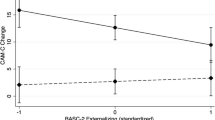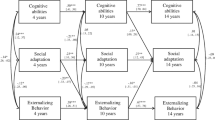Abstract
The present study investigated the role of children’s social and emotional functioning on their academic success in preschool. Data was collected from 81 children, and their teachers, in preschool programs in a Western Canadian municipality. Children completed measures of receptive language and academic functioning; teachers independently completed a standardized measure of children’s social and emotional functioning. Results indicated that children’s adaptive skills in the fall of preschool significantly predicted their academic scores in the fall and spring of their preschool year, with higher adaptive skills predicting higher academic scores. Children’s levels of internalizing problems were not found to significantly predict their academic skills during the preschool year. Children’s average levels of adaptive skills and internalizing problems significantly increased over the school year. This study highlights the connection between children’s social and emotional functioning and academic skills in preschool. Given these findings, early learning programs are encouraged to include components that promote the development of children’s adaptive skills, in addition to academic skills.
Similar content being viewed by others
References
Beesdo, K., Dipl-Psych, S. K., & Pine, S. D. (2009). Anxiety and anxiety disorders in children and adolescents: developmental issues and implications for the DSM-V. Psychiatric Clinics of North America, 32(3), 483–524. https://doi.org/10.1016/j.psc.2009.06.002.
Belfield, C., & Garcia, E. (2014). Parental notions of school readiness: how have they changed and has preschool made a difference. The Journal of Educational Research, 107(2), 138–151. https://doi.org/10.1080/00220671.2012.753863.
Beyer, T., Postert, C., Müller, J. M., & Furniss, T. (2012). Prognosis and continuity of child mental health problems from preschool to primary school: Results of a four-year longitudinal study. Child Psychiatry & Human Development, 43(4), 533–543. https://doi.org/10.1007/s10578-012-0282-5.
Blair, C., & Raver, C. C. (2015). School readiness and self-regulation: a developmental psychobiological approach. Annual Review of Psychology, 66, 711–731. https://doi.org/10.1146/annurev-psych-010814-015221.
Boivin, M., & Bierman, K. L. (2013). School readiness: introduction to a multifaceted and developmental construct. In M. Boivin & K. L. Bierman (Eds.), Promoting school readiness and early learning. Implications of developmental research for practice. New York, NY: Guilford Publications.
Bracken, B. A. (2007). Bracken School Readiness Assessment (3rd ed.). San Antonio, TX: The Psychological Corporation.
Bub, K. L., McCartney, K., & Willett, J. B. (2007). Behavior problem trajectories and first-grade cognitive ability and achievement skills: a latent growth curve analysis. Journal of Educational Psychology, 99(3), 653–670. https://doi.org/10.1037/0022-0663.99.3.653.
Campbell, S. B. (1995). Behaviour problems in preschool children: a review of recent research. Journal of Child Psychology and Psychiatry, 36(1), 113–149. https://doi.org/10.1111/j.1469-7610.1995.tb01657.x.
Carter, A. S., Wagmiller, R. J., Gray, S. A., McCarthy, K. J., Horwitz, S. M., & Briggs-Gowan, M. J. (2010). Prevalence of DSM-IV disorder in a representative, healthy birth cohort at school entry: sociodemographic risks and social adaptation. Journal of American Academy of Child and Adolescent Psychiatry, 49(7), 686–698. https://doi.org/10.1016/j.jaac.2010.03.018.
Cooper, J., Masi, R., & Vick, J. (2009). Social-emotional development in early childhood: what every policymaker should know. National Center for Children in Poverty report. Mailman School of Public Health, Columbia University.
Danzig, A. P., Bufferd, S. J., Dougherty, L. R., Carlson, G. A., Olino, T. M., & Klein, D. N. (2013). Longitudinal associations between preschool psychopathology and school-age peer functioning. Child Psychiatry & Human Development, 44(5), 621–632. https://doi.org/10.1007/s10578-012-0356-4.
Denham, S. A. (2006). Social-emotional competence as support for school readiness: what is it and how do we assess it. Early Education and Development, 17(1), 57–89. https://doi.org/10.1207/s15566935eed1701_4.
Domitrovich, C. E., Durlak, J. A., Staley, K. C., & Weissberg, R. P. (2017). Social-emotional competence: an essential factor for promoting positive adjustment and reducing risk in school children. Child Development, 88(2), 408–416. https://doi.org/10.1111/cdev.12739.
Duncan, G. J., Dowsett, C. J., Claessens, A., Magnuson, K., Huston, A. C., Klebanov, P., et al. (2007). School readiness and later achievement. Developmental Psychology, 43(6), 1428–1446. https://doi.org/10.1037/0012-1649.43.6.1428.
Dunn, D. M., & Dunn, L. M. (2007). Peabody picture vocabulary test (4th ed.). Circle Pines, MN: American Guidance Service.
Egger, H. L., & Angold, A. (2006). Common emotional and behavioral disorders in preschool children: presentation, nosology, and epidemiology. Journal of Child Psychology and Psychiatry, 47(3–4), 313–337. https://doi.org/10.1111/j.1469-7610.2006.01618.x.
Egeland, B., Kalkoske, M., Gottesman, N., & Erickson, M. F. (1990). Preschool behavior problems: stability and factors accounting for change. Journal of Child Psychology and Psychiatry, 31(6), 891–910. https://doi.org/10.1111/j.1469-7610.1990.tb00832.x.
Fantuzzo, J., Bulotsky-Shearer, R., McDermott, P. A., McWayne, C., & Frye, D. (2007). Investigation of dimensions of social-emotional classroom behaviour and school readiness for low-income urban preschool children. School Psychology Review, 26(1), 44–62 Retrieved from http://repository.upenn.edu/gse_pubs/152.
Glass, G. V., & Hopkins, K. D. (1996). Statistical methods in education and psychology (3rd ed.). Needham Heights: MA: Pearson Education.
Gullo, D. F. (2014). Multiple dimensions of biological development: implications for kindergarten readiness among young children in poverty. Journal of Social Science Studies, 2(1), 106–128. https://doi.org/10.5296/jsss.v2il.6394.
Harrison, P. L., & Raineri, G. (2008). Best practices in the assessment of adaptive behavior. In A. Thomas & J. Grimes (Eds.), Best practices in school psychology (5th ed., pp. 605–616). Bethesda, MD: NASP Press.
High, P. C., & American Academy of Pediatrics Committee on Early Childhood, Adoption, and Dependent Care and Council on School Health. (2008). School readiness. Pediatrics, 121(4), e1008–e1015. https://doi.org/10.1542/peds.2008-0079.
Hassan, Z. A., Schattner, P., & Mazza, D. (2006). Doing a pilot study: why is it essential? Malaysian Family Physician, 1(2&3), 70–73.
Janus, M., & Duku, E. (2007). The school entry gap: socioeconmic, family and health factors associated with children’s school readiness to learn. Early Education and Development, 18(3), 375–403. https://doi.org/10.1080/10409280701610770.
La Paro, K. M., & Pianta, R. C. (2000). Predicting children’s competence in the early school years: a meta-analytic review. Review of Educational Research, 70, 443–484.
McLeod, B. D., Sutherland, K. S., Martinez, R. G., Conroy, M. A., Snyder, P. A., & Southam-Gerow, M. A. (2017). Identifying common practice elements to improve social, emotional, and behavioral outcomes of young children in early childhood classrooms. Prevention Science, 18(2), 204–213. https://doi.org/10.1007/s11121-016-0703-y.
Montes, G., Lotczewski, B. S., Halterman, J. S., & Hightower, A. D. (2011). School readiness among children with behaviour problems at entrance into kindergarten: results from a U. S. national study. European Journal of Pediatrics, 171(3), 541–549. https://doi.org/10.1007/s00431-011-1650-4.
National Education Goals Panel. (1991). The National Education Goals report. Washington, DC: National Education Goals Panel.
Nix, R. L., Bierman, K. L., Domitrovich, C. E., & Gill, S. (2013). Promoting children’s social-emotional skills in preschool can enhance academic and behavioural functioning in kindergarten: findings from Head Start REDI. Early Education and Development, 24, 1000–1019. https://doi.org/10.1080/10409289.2013.825565.
Nix, R. L., Bierman, K. L., Heinrichs, B. S., Gest, S. D., Welsh, J. A., & Domitrovich, C. E. (2016). The randomized controlled trial of Head Start REDI: sustained effects on developmental trajectories of social-emotional functioning. Journal of Consulting and Clinical Psychology, 84(4), 310–322. https://doi.org/10.1037/a0039937.
Pagani, L. S., Fitzpatrick, C., Archambault, I., & Janosz, M. (2010). School readiness and later achievement: a French Canadian replication and extension. Developmental Psychology, 46(5), 984–994. https://doi.org/10.1037/a0018881.
Paulus, F. W., Backes, A., Sander, C. S., Weber, M., & von Gontard, A. (2015). Anxiety disorders and behavioural inhibition in preschool children: a population-based study. Child Psychiatry and Human Development, 46(1), 150–157. https://doi.org/10.1007/s10578-014-0460-8.
Qi, C. H., & Kaiser, A. P. (2003). Behavior problems of preschool children from low-income families: review of the literature. Topics in Early Childhood Special Education, 23(4), 188–216. https://doi.org/10.1177/02711214030230040201.
Quirk, M., Dowdy, E., Goldstein, A., & Carnazzo, K. (2017). School readiness as a longitudinal predictor of social-emotional and reading performance across the elementary grades. Assessment for Effective Intervention, 42(4), 248–253. https://doi.org/10.1177/1534508417719680.
Reynolds, C. R., & Kamphaus, R. W. (2004). Behavior assessment system for children (2nd ed.). Circle Pines, MN: American Guidance Service.
Romano, E., Babchishin, L., Pagani, L. S., & Kohen, D. (2010). School readiness and later achievement: replication and extension using a nationwide Canadian survey. Developmental Psychology, 46(5), 995–1007. https://doi.org/10.1037/a0018880.
Rose-Krasnor, L. (1997). The nature of social competence: a theoretical review. Social Development, 6, 111–135. https://doi.org/10.1111/j.1467-9507.1997.tb00097.x.
Sabol, T. J., & Pianta, R. C. (2017). The state of young children in the United States; school readiness. In E. Votruba-Drzal & E. Dearing (Eds.), The Wiley handbook of early childhood development programs, practices and policies (3–17). West Sussex, UK: John Wiley & Sons.
Shonkoff, J. P., & Phillips, D. A. (Eds.). (2000). From neurons to neighborhoods: the science of early childhood development. Washington, DC: National Academies Press.
Snow, K. L. (2006). Measuring school readiness: conceptual and practical considerations. Early Education and Development, 17(1), 7–41. https://doi.org/10.1207/s15566935eed1701_2.
Tabachnick, B. G., & Fidell, L. S. (2013). Using multivariate statistics (6th ed.). Upper Saddle River, NJ: Pearson Education Inc..
Thompson, R. A., & Goodman, M. (2011). Development of self, relationships, and socio-emotional competence. In O. A. Barbarin & B. H. Wasik (Eds.), Handbook of child development and early education: research to practice (pp. 143–171). New York: Guilford Press.
Walker, O. L., & Henderson, H. A. (2012). Temperament and social problem solving competence in preschool: influences on academic skills in early elementary school. Social Development, 21(4), 761–779. https://doi.org/10.1111/j.1467-9507.2011.00653.x.
Wood, J. J. (2007). Academic competence in preschool: exploring the role of close relationships and anxiety. Early Education and Development, 18(2), 223–242. https://doi.org/10.1080/10409280701282868.
Woodcock, R. W., McGrew, K. S., & Mather, N. (2001). Woodcock-Johnson III tests of achievement. Itasca, IL: Riverside Publishing.
Funding
This study was funded by the Public Health Agency of Canada—Alberta/NWT Region.
Author information
Authors and Affiliations
Corresponding author
Ethics declarations
Conflict of Interest
The authors declare that they have no conflict of interest.
Ethical Approval
All procedures performed in studies involving human participants were in accordance with the ethical standards of the institutional and/or national research committee and with the 1964 Helsinki declaration and its later amendments or comparable ethical standards.
Informed Consent
Informed consent was obtained from all of the individual participants included in the study.
Additional information
Publisher’s Note
Springer Nature remains neutral with regard to jurisdictional claims in published maps and institutional affiliations.
Rights and permissions
About this article
Cite this article
Walker, M.A., Rinaldi, C. Children’s Social and Emotional Functioning and Academic Success in Preschool: the Role of Internalizing Problems and Adaptive Skills. Contemp School Psychol 24, 25–33 (2020). https://doi.org/10.1007/s40688-019-00232-5
Published:
Issue Date:
DOI: https://doi.org/10.1007/s40688-019-00232-5




